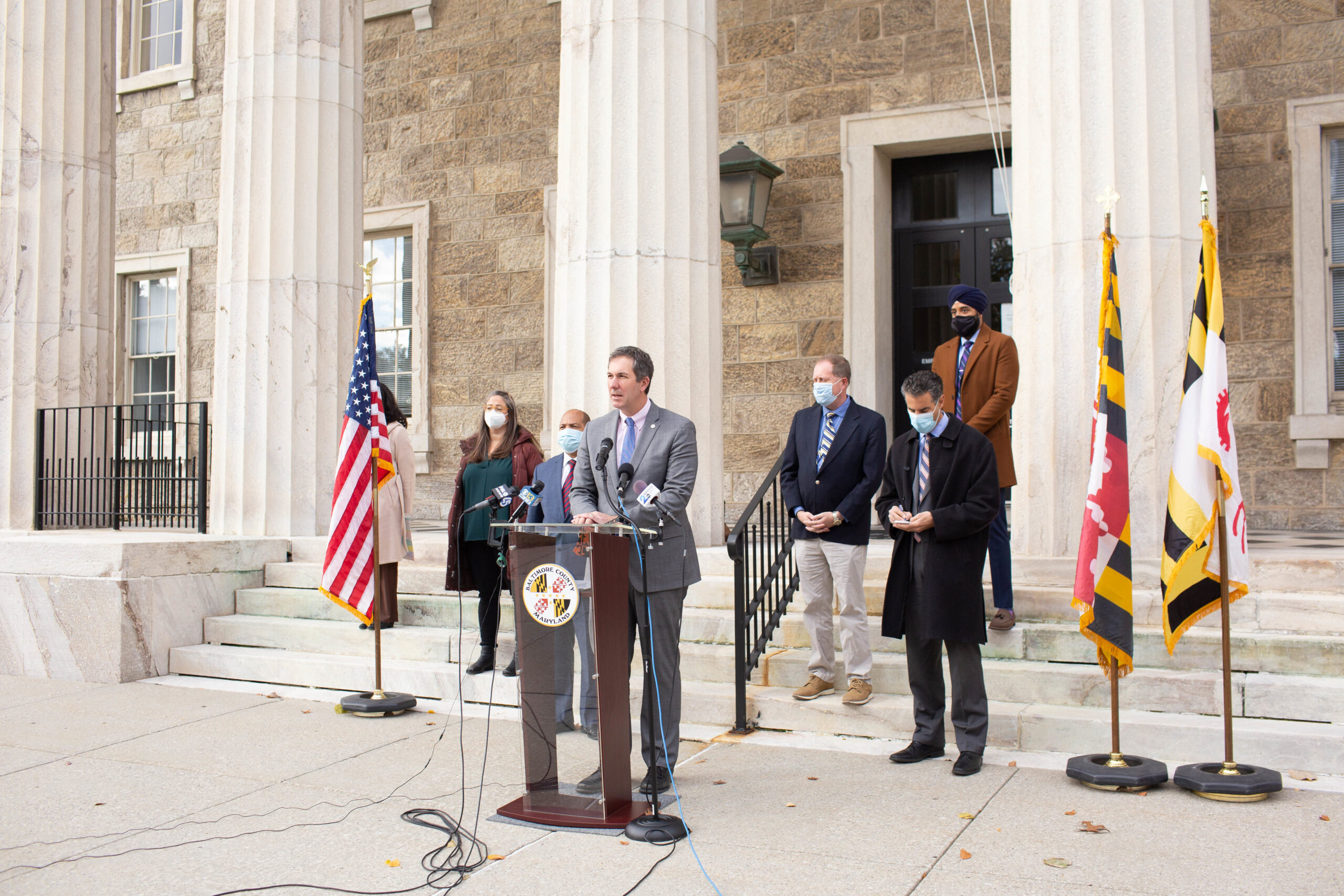Baltimore County Set to Vote on Public Campaign Financing Plan

The Baltimore County Council is set to vote on a bill that would set up a public campaign finance system in the jurisdiction Monday, potentially creating a tiered funding system to prioritize smaller donations.
Under the bill sponsored by Council Chair Julian E. Jones (D) and Councilmember David Marks (R), candidates would have to file a notice of intent to participate in the public financing system, set up a new campaign account and meet the following conditions to participate in the planned program:
- Only accept donations from individuals;
- Only accept donations of $250 or less;
- Refuse donations from political action committees, corporations, political parties and other candidates; and
- Candidates would also have to prove their campaign is viable by meeting a minimum threshold of $40,000 in qualifying contributions from at least 500 local donors for county executive candidates and $10,000 in qualifying contributions from at least 125 local donors for county council candidates.
According to the bill, public matching funds would be distributed in a tiered system to prioritize smaller donations: Candidates for county executive would receive $6 for each dollar of the first $50 in a donation, $4 for each dollar of the second $50 in a donation and $2 for each dollar of the third $50 in a donation. Matching funds would phase out after $150. For a maximum donation of $250, for example, a county executive candidate would receive $600 in matching funds.
Candidates for county council would receive $4 for each dollar of the first $50 of a donation, $3 for each dollar of the second $50 and $2 for each dollar of the third $50. Matching funds would also phase out after $150 for county council candidates who participate in the program. That means a county council candidate would receive $450 in matching funds for a maximum individual donation of $250.
Public matching funds are capped at $750,000 for county executive candidates in a campaign cycle and $80,000 for county council candidates.
Baltimore County voters approved a charter amendment last November to create a Citizens’ Election Fund system in the county, and the tiered financing system in the bill is based on recommendations from the county’s Fair Election Fund Work Group, which was chaired by Jones and included community members, elected officials and community members.
At a work session last week, some council members suggested that the county’s public campaign financing system should also include a limit on how much participating candidates can spend. Councilmembers Wade Kach (R) Thomas E. Quirk (D) were concerned that the public campaign financing system would further drive up election costs in the county.
“It’s always been my understanding that public financing brings along limits in spending,” Kach said. “There’s really no limits in spending with this particular legislation. It just limits how much the county is going to help subsidize somebody’s campaign.”
Quirk likewise said he thought the county’s public campaign financing system should aim to limit spending in addition to subsidizing campaigns.
“If you’re not controlling the spending side, I think it’s missing the target here,” Quirk said.
Joel Beller, deputy director of government affairs for Baltimore County Executive John A. Olszewski Jr. (D), said running a campaign for a county council seat or county executive has already become an expensive endeavor in the county.
“Increased spending is here, whether we like it or not,” Beller said.
Fair elections advocates say putting a cap on spending for candidates who participate in public financing will make it hard for them to compete with candidates taking money from large donors with no spending limits.
Joanne Antoine, the executive director of Common Cause Maryland, said in an interview that election costs have been going up in the county for years.
“The cost of our elections are always going to continue to increase,” Antoine said, “and that’s why we set the program up in a way where, even though there’s a max in terms of how much you can receive on the cap, people can still continue to give.”
Antoine said putting a limit on how much participating candidates can spend would disincentivize participation in the program. She said the proposed public campaign finance program isn’t meant to limit spending in local elections, but rather to promote small, local donations over those from special interest groups and big businesses.
“It wouldn’t be a working model at all, and I think the way that a few members of the Council were thinking about the program really is just an outdated model,” Antoine said.
Emily Scarr, the director of Maryland PIRG, said a spending cap would only work if every candidate had to participate in the program — and local governments aren’t allowed to require candidates to opt into public campaign financing programs. She said limiting spending in the voluntary program would make it “virtually impossible” for publicly financed candidates to keep up with others.
“It’s not necessary to limit the money as much as what type of money they’re raising,” Scarr said.
In addition to Maryland’s statewide public financing system, various local jurisdictions have similar programs. Montgomery County was the first to set up a program in 2014, and Baltimore City, Howard County and Prince George’s County have all since enacted their own programs. Those programs do not have spending limits for participating candidates.
The Baltimore County program is expected to be up and running by the 2026 election.
Also on Monday, the council will vote on new council election districts. At a work session last week, residents and civil rights advocates urged council members to reject that redistricting plan because it includes just one majority Black council district out of seven.




 Creative Commons Attribution
Creative Commons Attribution